Why Not Direct Democracy?
Would bypassing politicians altogether make the system more just?
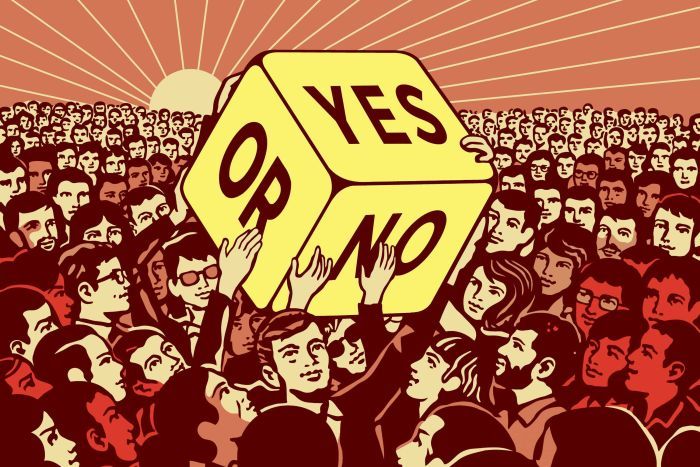
Dave Schuler asks the titular question:
For all of the pontificating about how undemocratic our political system is and how much better a strictly majoritarian system would be, I’m not seeing any calls for direct democracy. Has anyone wondered why? I would think that if you believe in a strictly majoritarian system (1/2 + 1 votes rules) that direct democracy would be the ideal.
Speaking for myself, I don’t “believe in a strictly majoritarian system.” I prefer a government that is limited in its power over the individual and which is required to recognize fundamental rights. I think that’s true of the vast majority of Americans, including those calling for reform of our democratic institutions.
Outside of very limited settings (mostly small private clubs and the like) I’m not a fan of direct democracy, either. Governing anything large and complex is better delegated to people with the talent and time to devote to it.
That leaves the form that essentially all governments that practice democracy in modern times have taken: some form of representative government, in which people vote for leaders who will, well, represent them. This in turn can take many forms, none of which we need to go into here.
I gather from the discussion in the comments section, though, that Dave’s concern isn’t some variant of the “a Republic, not a democracy” trope but rather that powerful interests dominate our current system. He contends that, at least Illinois and Chicago, in particular, “Corporations and labor unions, particularly public employees’ unions, rule. The actual views of the people are quite different than might be inferred from our elected representatives.” Later in the thread, he labels the system “Hobson’s choice.”
Some of the reforms that Steven Taylor (particularly) and I have touted here over the years, whether enlarging the size of the US House of Representatives, going to direct election of the President rather than filtering the vote through the Electoral College, or more radical changes like getting rid of single-member districts would help make the representatives better align with the will of the people. Given that most seats aren’t competitive (and that’s often just as or more true at the state and local level), politicians only have to worry about the party primaries and keeping the powerful elements of the base happy.
I suppose having more referenda, which have been popular in the Western part of the country for generations, would also make the system more representative in some ways. But, given that the voters would have very little understanding of most of the issues, I suspect that the organized, monied interests that frustrate Dave under the current system would tend to dominate that process as well. They would not only fund most of the advertising but are much better able to organize turnout.


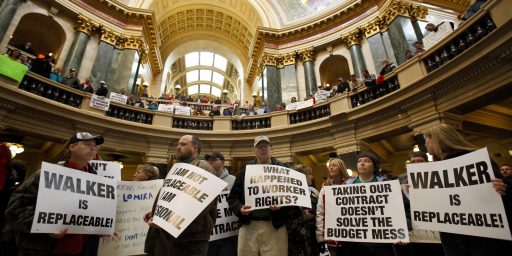
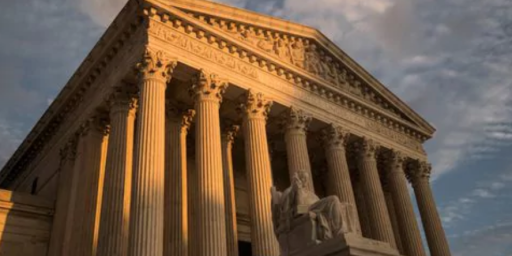
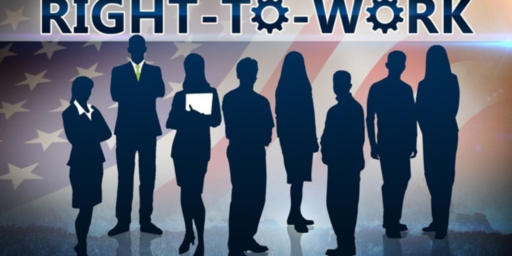
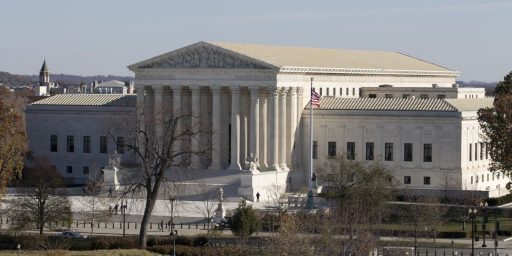
Because direct democracy in a polity of 330 million can’t possibly work. Next question? James lays out a number of the multitude of reasons.
Critics say democrats must have faith that there’s some mystical wisdom of the masses. No. I think history shows democracy works better than anything else that’s been tried. But not because the opinions of everyone count, but because the interests of everyone count, at least to some extent. A fine distinction, perhaps, and difficult in practice.
I have a very odd view of things, that’s a bit difficult to describe. I think money matters, but it is a thresholding effect. That is, if a candidate doesn’t have enough money (and yes, “enough” is a bit hard to pin down) then they are sunk regardless of other qualities, including party.
But when both candidates in a general election have enough money, then the money doesn’t matter any more. Having the most money doesn’t predict the outcome very well. It can matter at the margins, but more ad time when you’ve already done a saturation buy, isn’t going to matter. For instance.
So that’s more in the way of a rebuttal to Dave Shuler’s complaints (which are far from unique to him). Maybe we need to trust the voters more. Maybe those votes for pro-union things reflect the wishes of the voters of Chicago and Illinois. Maybe they like unions, even though Dave doesn’t?
As for me, I’m for democracy in some form because it means that when the government screws up, we can change it.
I mean, if we get to a place where things are messed up pretty hard, but we can’t change course because that means putting the “baby killers” in charge, that’s a recipe for disaster. That’s how you get conned, too. “I may be terrible but I’m not a baby killer” should not be a successful argument for president, but it appears it was.
But that’s because of structure – the structure of the EC. Which is now a very serious problem.
In the words of an uncle:
I may love my neighbour; but I’m not fool enough to trust him.
Being a New Englander and living in a town, our governing structure is about as close to pure democracy as you are likely to get. Classically, all interested voters should gather to discuss and vote on the issues. That doesn’t happen, because few towns have a facility large enough to have more than a few hundred gather. Of course those are only the ones who can spend hours at the meeting. So we’re a step away and a town meeting warrant is drawn up by the Select Board (another step away from pure democracy) and the line items are voted on in March. Even under that model participation is sketchy.
This is a long way of saying that a pure democracy wouldn’t work, but we do need a more a less minoritarian representative democracy.
Granted I am not a political scientist and I dont know how elections work in every state, but my superficial understanding is that all, or at least most, most state and local elections are majoritarian or at least a plurality. The person with the most votes wins. It is our POTUS election which is different.
I cant believe anyone would believe that a direct democracy would eliminate special interests effects. They would be just as large or worse.
Steve
I’ve lived in the West all my life (minus the 8 years in Korea–even further west 😉 ) and have never seen any evidence that lack of understanding stopped anyone from having opinions, or even writing initiative measures. That said, the monied interests shape the outcomes a fair amount of the time, provided that they care about the issues (which is not always the case).
Referenda out west are not great. There are paid signature gatherers, and it is more often than not just a way for right wing freaks to get something on the ballot that will sound nice but have far reaching consequences.
Usually cutting taxes that then leads to either unpopular cuts of services, or new taxes elsewhere to make up for lost revenue.
It’s voting for a pony without bothering to make the proper trade offs — you have to feed and house a pony, and someone has to scoop up the shit.
(If referenda we’re prohibited from affecting taxes, would it be better? Maybe)
I prefer a government that is limited in its power over the individual and which is required to recognize fundamental rights. I think that’s true of the vast majority of Americans, including those calling for reform of our democratic institutions..
If this were true, bail reform would be a no-brainer. The use of bail to keep innocent people in jail is a complete violation of an individual’s rights. If the government wants to argue that a person represents a threat and can’t be released they should argue that. Instead, bail is used and there is no speedy trial.
No, limited government is just a fantasy for disaffected businessmen and middle management paid for by corporations that want to turn America into cancer alley. This is the real problem with democracy and that is many people are not only reactionary but incapable of dealing with others on an equal basis, and their utopia is a 19th century factory town where everything is going great (according to the owner).
This gets back to the whole idea of what is a “flawed” democracy. James, Steven and others suggest the present system is flawed because it isn’t sufficiently majoritarian or representative.
On the other side of that spectrum is direct democracy, which is maximally majoritarian and representative. But we know that doesn’t work in practice.
So the question becomes where to draw the line. To make democracy actually work, you need undemocratic and anti-majoritarian institutions and systems. Otherwise, our flawed human nature will devolve into mob rule.
A lot of people say a lot of bad things about the undemocratic and anti-majoritarian features of the US federal government – yet the system has stood the test of time and succeeded (with one exception) at one of the primary goals of any democratic government – the peaceful transfer of political power.
I often write here – mainly in Steven’s posts – about how I would prefer a different system because I really, really hate how our system forces a binary choice, neither of which represents my interests. At the same time, to get to that ideal system requires that a super-majority of the US population not only agree with my personal vision of what a better system would be, but also requires that supermajority to pressure elites and politicians to make the necessary changes.
The problem, of course, is that no one agrees with me or my vision, or anyone else, and no common alternative vision exists. The country is very divided. Changing the present system at all, even when it polls in a majority, has exceedingly thin support.
The most strident calls for radical structural reforms come primarily from academics and partisans who think they would gain an advantage under the changes. Not exactly a winning coalition in a highly divided polity.
In this kind of environment, I do not see a way to get from here to where I’d like to be, or something that is objectively better – and better not by the standards of the ivory tower (sorry Steven) or upset partisans, but better by the standards of the American people generally.
So I am, for now, of the mind to “dance with the one who brought you” and make incremental changes to improve the existing system. The top two in my book are reforming primaries and expanding the size of the House.
One of the things that I believe is critical to the success of referendums and initiatives in Colorado is the blue book that comes to every registered voter a few weeks before the election. Every referendum and initiative is covered, starting with a clear summary and providing enough detail to make even former staffers like myself happy. The material is written by the non-partisan legislative staff, the same folks that write similar summaries and analyses for every bill introduced in the state legislature to inform our part-time members. The writers are very, very good at the job. For completeness, the blue book also includes short statements written by both supporters and opponents of the measures, clearly marked. These are reviewed by the staff and actual false statements are rejected.
When people ask me — some because they know I’m a former staffer — I tell them, “Pay no attention to the ads. Wait for the blue book, read the summary, then as much of the details as you want.”
To quote a lawyer friend who has practiced in California for decades, “The voters understand and get it right at least as often as the elected legislators, probably more.”
All of this is an argument at the state level. I would never support national referendums in a country with 330M people with the contiguous part almost 3,000 miles across.
A few weeks ago, Governor Evers called a special session of the legislature to discuss new legislation allowing referenda in Wisconsin.
The Republican-led assembly gaveled in and out in a matter of seconds (literally about 10 seconds). Allowing more direct democracy requires the approval of those in charge.
Don’t expect it to happen very easily (if at all).
@Michael Cain:
+1000 for the Blue Book here in Colorado.
Like anything, the details of implementation matter a great deal. Referendums can work just find if you get the details and implementation right.
@Gustopher:
I don’t know about better, but there’d certainly be fewer. Maybe you have to take whatever you can get and try to work with it. [shrug emoji]
@Mister Bluster: A statement giving the reader why you think this passage of factoids matters might be helpful to the readers of your post. Just sayin’.
*One of the things I used to try to teach my writing students was that persuasive message was a combination of “source” and “you.” Ideally, there would be more “you” than “source,” but ideals are not always easy to reach. (Of course, I’m also open to the possibility that the source was quoted for no purpose at all, but why bother in that case?)
To begin with, because representative democracy is not the same as participatory democracy.
The latter was the norm mostly in ancient times, when democracy of some form existed. Citizens* would debate and vote on laws, or would at least listen to debates on laws before voting on them. At that, there were fewer laws and more assemblies (it’s rather complicated). I don’t think this would work in a setting larger than a small town these days. And small town laws are rather limited by federal and state laws.
Then, too, imagine a national vote on everything from continuing resolutions to the Affordable Care Act. Would every citizen be allowed to propose amendments? Or would citizens only vote yes or no? Would a legislature, never mind a bicameral one, still be necessary, or would its functions be carried out by citizen assemblies?
And then I’ll invoke the Jason Mendoza Principle: who the hell has the time to work for a living, live a life, care for family, etc. and become well-informed enough about legislation in order to render a reasonable vote?
That’s how come we hire legislators.
@Andy: I’ll make the same comment about your post. Your audience may well be interested in knowing what’s broken/dysfunctional/in need of improvement about current primaries and what a solution might look like. For my own two cents worth on this topic, while I might agree that the primary system is less than what it could be, it appears to be what voters are willing to work within the restraints of, and therefore, might not be improvable without better voters.
But that argument will derail the discussion, so I usually try to avoid making it (except when frustration overwhelms me) and am only stating it for the record now, not as a starting point for discussion. (It’s an “article of faith”-type of argument and may not be moot because the direct counter is “no, the voters are just fine.”)
@Kathy:
Referendums, initiatives, and recalls became a thing in the American West because of the incredible corruption that existed in the state legislatures.
Remember that many of the western US states were added for political purposes. For example, if one of the national political parties felt they needed more votes in the US Senate and was in a position to do the job right now, they would create a new state but only if the governor and the wealthy folks would ensure that the new Senators the state legislature would appoint were members of the “right” party who would vote the way the Eastern political powers told them to. Eastern business interests who wanted US Senate support — say, for cheap access to mining claims on the public lands — found it easier (and much less expensive) to pay off a dozen state legislators who would then appoint someone who would vote the right way on that issue. Or threaten to not appoint them again if they didn’t go along. It was not unheard of for state legislators to go to their desks in the capital in the morning during the session and find literal bags of money. The push for the 17th Amendment — direct election of US Senators — got started in the American West.
Possibly interesting side note… I was on the Colorado legislative staff for three years. Political institutions have long memories. I was quite surprised to see how much institutional dislike and distrust of the federal government and “eastern” businesses still existed.
@Michael Cain:
It’s funny what gets left out of history books, even in revisionist, non-traditional ones.
Oh come off it, Most people can’t be bothered to care where their Rep stands on a particular issue much less the wording of a law, and you want to propose they actually govern themselves? Shieet, they do well to pay their bills.
(And yes, I know you know this.)
@Just nutha ignint cracker:
Understood. I don’t intend to veer into a debate about primaries – I just wanted to give my overall perspective.
@Andy: Fair enough. Still, it might make an interesting discussion. Or it could turn into one of our OtB versions of a flame war. That could be interesting, too, but not for very long. Already, I don’t read most of the posts on threads like the ones a couple of days ago about words having/not having power. The comments get real wearing real fast.
It was not unheard of for state legislators to go to their desks in the capital in the morning during the session and find literal bags of money.
One problem with American democracy is that actual desires by normal voters are treated as if they were requests for sacks of cash. Per the example in the post, the power of the public sector union in the Illinois has given teachers in Chicago an average pay of 48K a year. 48K a year. That is barely above a living wage in Chicago. And yet somehow this is a destructive form of democracy, where interest groups are feeding at the public trough, gorging themselves on 48k/year salaries. Ironically, in my lifetime we have solved zero fiscal problems re: entitlements and gov’t pension plans, and the attitude has always been the same contempt at the thought of a decent life, and just feigned amazement at how corrupt the process is.
I used to believe that this is simply class politics. I.e., A normal American has been taught to not give a shit about rich people sucking up serious wealth but will get real focused on the union employees who manage to use collective bargaining to get a better raise than they did. I’m not sure what i believe now…
@Modulo Myself:
That’s quite a bit lower than what I’ve seen. Can you share your source?
@Kathy:
And comes out at the oddest times. When Walker Stapleton ran for Governor of Colorado in 2018, for the first time in his political career he played the card that his great-grandfather was Benjamin Stapleton, five-term mayor of Denver and responsible for a very large number of civic improvements. Denver’s long-time Stapleton Airport was named for him. He was also a member of the Ku Klux Klan, which very much ran Denver* and Colorado in the 1920s.
Walker lost the 2018 election badly. The people living in the Stapleton redevelopment project at the site of the former airport named after the great-grandfather changed their name to get rid of the Stapleton association. He had a reasonable chance of winning that year, if he’d just left great-grandpa out of it.
* The Black population in Denver and Colorado has never been large enough to really matter. The Klan found other groups to hate.
@Just nutha ignint cracker:
Yeah, I regret spending that much time debating semantics, it was all mostly a waste of time. I would say a complete waste of time, but there was some positive engagement.
@Mimai:
It’s right here. For whatever reason it came up first in my work laptop on Bing. Looking at a few other sites, maybe it’s 60K or 65K? Who honestly cares? We’re talking about a middle-class job in a city. These are not unreasonable salaries.
@Modulo Myself:
Thanks. Here is a good resource with excel data that you can play around with. If you care that is 😉
@Mimai:
I flipped through that excel sheet and like what I am supposed to take away from this? Actually, teachers seem to start out at 65K a year and then top out around 110K? Wow, that’s nuts. Totally refutes my central point about how public sector unions are not ruining democracy. Well no, not really. Seems great to me. If you spend 20-30 years working at a job you should be getting something along those lines.
Honestly I had zero clue what Chicago teachers made before I googled. 48K was super low but I went with it. In a certain sense it’s bizarre that anyone who is not a Chicago teacher would be carrying these numbers around or would have heard about them, but obviously, politically we need scapegoats so we have to pretend that the flaw here is teachers asking for reasonable pay.
@Modulo Myself:
I don’t believe we’ve interacted before, so I may be misreading you. And vice versa. I had (have) zero agenda wrt this issue. The $48k seemed low based on nothing but my intuition. That’s why I asked you for a source. And because I was curious myself, I looked into it and stumbled upon the excel data. Upon finding it, I thought I’d pass it along. It really is that simple. No agenda. No point to make. Just basic curiosity.
@Modulo Myself: Wa! In Washington, I make $23/hr substitute teaching. And that’s only about 3/4ths of the base salary for a fresh outta college teacher. Of course, a full-time teacher works more than the 180 days that (potentially) a substitute could work. The last year I taught k12 full-time, I worked 192 calendar days. Our year is still about that size in WA and OR.
@Modulo Myself: @Mimai: I’d be curious to see what the salary ladder in the contract says about salaries relative to education, longevity, and extra duty pay (which is usually pitiful 🙁 ). The spread sheet tells what people are actually making but doesn’t show why the rates are what they are.
When I worked for the state legislature, I saw directly what it takes to research legislation – and it’s very, very complex.
Members would drop their bill ideas in the “hopper” on everything from cocktail napkins to formally printed pages, and an entire 50+ staff of lawyers would write the actual legislation to be voted on.
Committee staff would create fiscal notes on every bill – that’s just the fiscal impact of a bill, never mind other societal impacts, committees themselves would hear hundreds of hours of testimony from interested parties, lobbyists would spend more hours in direct 1:1 meetings with legislators — all of which happens before any floor debate.
Then striker amendments would be proposed that would range from knocking out and replacing a single word – all the way to striking and replacing the entire text of a bill except for its name.
Then other amendments would be proposed that would need to be ruled on scope & object relevance before votes could be taken.
The constitution provided for 3 readings of each bill – which the opposition could require be done out loud on the chamber floor as a delay tactic, but mostly the readings were waived.
I’m not saying that representative democracy can’t be improved, but I am saying that the average citizen does not have the time, knowledge, or patience to perform that level of consideration on very impactful legislation. Direct democracy will result in bills with the best ad campaigns being passed.
IMHO, it matters less whether we have direct democracy or representative democracy than it is to find ways of cutting through the fog of disinformation that seems to enshroud every political issue of importance. What we see today is the fruit of the GOP’s sixty-year-war against the free press. Until we can build information sources whose credibility is generally trustworthy (Repub- or Dem-leaning), lasting improvements are unlikely.
@Mimai:
Interesting spreadsheet. I think it’s best to look at total compensation, not just the salary, especially with public employees who tend to get a lot of deferred compensation.
From what I can tell, the lowest-paid full-time “regular teacher” on that list received $55k in base pay and another $22k worth of benefits while the highest-paid “regular teacher” had $132k in pay and $39k in benefits.
It gets more complicated with pensions. CPS teachers do not pay into social security and won’t get social security benefits from CPS employment, but they have a very generous pension system (can retire as early as 55 with 75% of their final average salary plus full benefits). Teachers are supposed to pay 9% of their salary to the pension, but CPS actually pays most of that – teachers pay 2% toward their pensions and CPS pays the remaining 7%. So their take-home pay is going to be 5.5% higher than people who pay into social security.
But, like many pensions around the country, the CPS pension system is severely underfunded. Like a lot of public employee pension systems, unions and government negotiators promised significant future benefits while kicking the can on how to fund them. It seems likely it will need a bailout at some point.
Anyway, that’s not bad, no one should be crying because of CPS teacher compensation – $55k at the lowest end plus full benefits for a job that comes with summers off and retirement with 75% of your salary at 55 isn’t a bad deal.
Whether that is too much compensation or not enough or just right for Chicago and workforce recruiting and retention is something I don’t have an opinion on, that’s really up to the people of Chicago.
@Just nutha ignint cracker:..ideals are not always easy to reach
I must have missed your class that day…
.